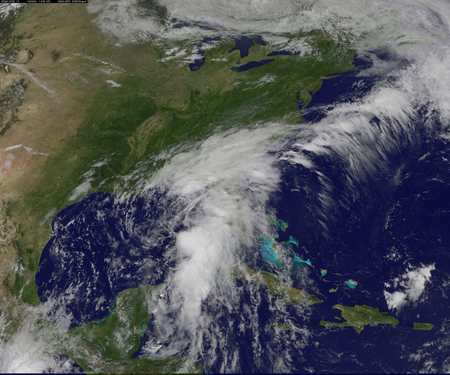Advertisement
No longer tropical storm, Colin still felt in Florida

By Letitia Stein
TAMPA, Fla. (Reuters) – The storm Colin dissipated off coastal North Carolina on Tuesday and moved out to sea after pounding the U.S. Southeast with torrential rains and winds, but flooding remained a concern in parts of Florida that received the brunt of the tropical storm.
Colin was downgraded to a post-tropical cyclone southwest of coastal North Carolina. As it moved off to sea in the afternoon, it packed winds up to 60 miles per hour (95 kph), National Hurricane Center in Miami said.
The storm was downgraded just hours after making landfall on Florida’s northern Gulf Coast early Tuesday. It then swept across Georgia on its path to the Atlantic, affecting coastal South and North Carolina.
Although tropical storm warnings had been discontinued, flood watches remained in effect for 24 of Florida’s 67 counties, the governor’s office said in a statement.
The storm dumped as much as 10 inches of rain on Florida communities around Tampa, Tallahassee and Gainesville, according to the National Weather Service.
With one to five inches of additional rain expected to douse central Florida into Tuesday evening, some Tampa Bay area municipalities continued to supply sandbags to residents.
Near Clearwater, Florida, authorities used boats and emergency equipment to evacuate 30 people from a mobile-home park inundated by flooding. No one was injured, according to the Largo Police Department, which was involved in the efforts.
As much as two feet of water entered some homes, said Tracy Rascher, property manager at the Mariners Cove Mobile Home Park.
“They aren’t doing very well,” she said. “They don’t have a place to go back to tonight.”
Before the storm hit, Florida Governor Rick Scott declared a state of emergency in 34 counties. He also activated the Florida National Guard, which remained on alert on Tuesday.
Colin also threatened crops in Florida, the country’s biggest citrus producer, and sent U.S. orange juice futures on Monday to their highest in more than two years.
The storm is part of a brisk start to the Atlantic hurricane season that runs through Nov. 30. Over the U.S. Memorial Day holiday weekend, the Carolinas were lashed by heavy rain and winds from Tropical Storm Bonnie.
(Additional reporting by Colleen Jenkins in Winston-Salem, N.C.; Editing by Bernadette Baum and James Dalgleish)











